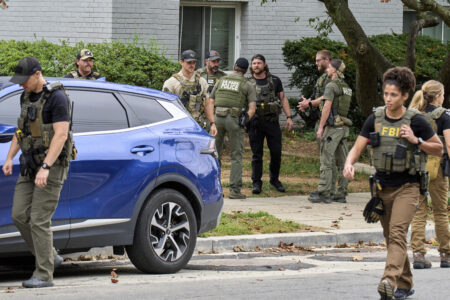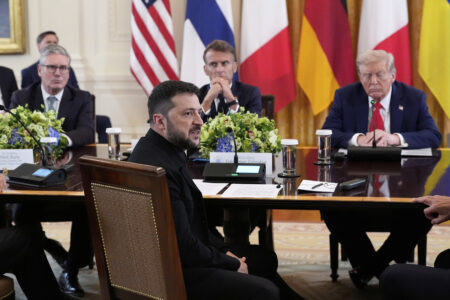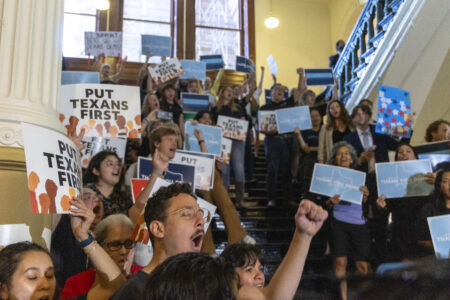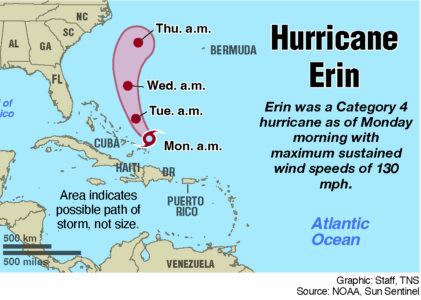Out-of-state Guard troops arrive in DC neighborhoods
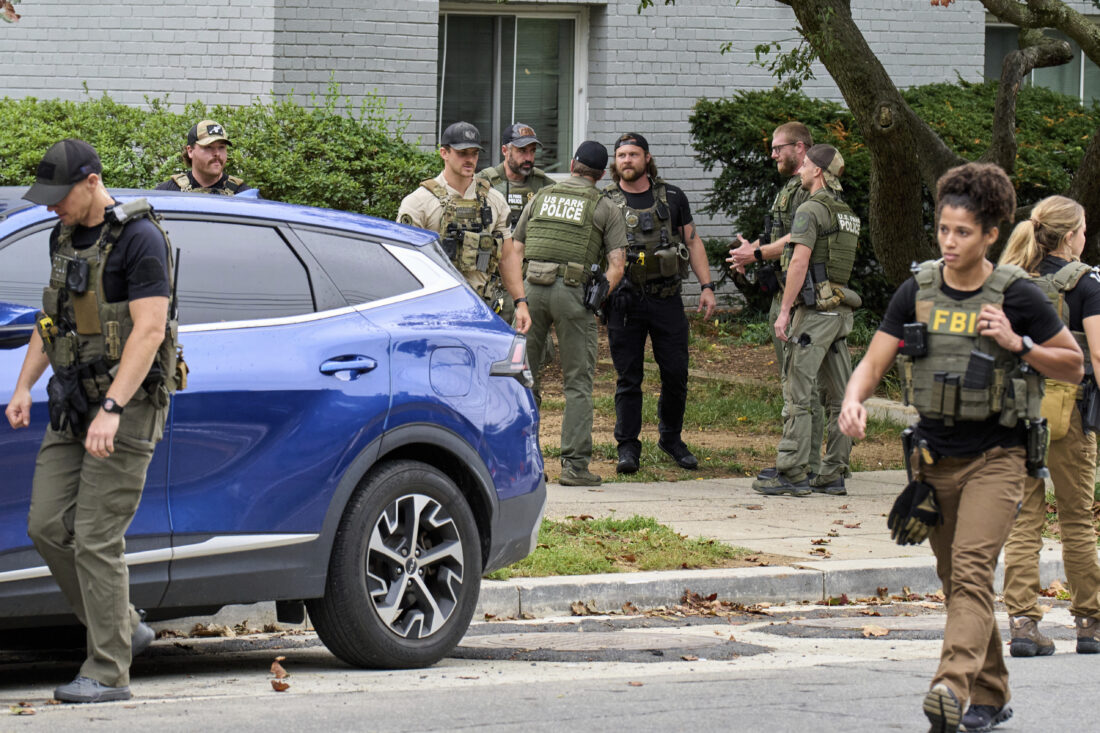
Officers from several federal agencies including FBI, Federal Marshalls, HSI, and Park Police, leave an apartment complex after arresting a man from within the apartments on Tuesday in the Petworth neighborhood of northwest Washington. (AP Photo/Jacquelyn Martin)
WASHINGTON (AP) — The main drag in Washington’s Columbia Heights neighborhood is typically crammed with people peddling pupusas, fresh fruit, souvenirs and clothing. On Tuesday, though, things felt different: The white tents that bulge with food and merchandise were scarcer than usual.
“Everything has stopped over the last week,” said Yassin Yahyaoui, who sells jewelry and glass figurines. Most of his customers and fellow vendors, he said, have “just disappeared” — particularly if they speak Spanish.
The abnormally quiet street was one of many pieces of evidence showing how President Donald Trump ‘s decision to flood the nation’s capital with federal law enforcement and immigration agents has rippled through the city. While troop deployments and foot patrols in downtown areas and around the National Mall have gotten the most attention, life in historically diverse neighborhoods like Columbia Heights is being reshaped as well.
The White House has credited Trump’s crackdown with hundreds of arrests, while local officials have criticized the aggressive intervention in the city’s affairs.
The confrontation escalated on Tuesday as the top federal prosecutor in D.C. opened an investigation into whether police officials have falsified crime data, according to a person familiar with the situation who wasn’t authorized to comment publicly. The probe could be used to bolster Trump’s claims that the city is suffering from a “crime emergency” despite statistics showing improvements. The mayor’s office and the police department declined to comment.
National Guard members from West Virginia, South Carolina, Mississippi and Louisiana began arriving in Washington on Tuesday to assist in the crackdown, according to Joint Task Force District of Columbia, the military unit overseeing the D.C. Guard. Those troops from other states will perform similar duties to D.C. Guard members already on the streets, including protecting landmarks and crowd control, and will be staying at military base housing and hotels, JTF-DC said.
Blocks away from where Yahyaoui had set up shop, U.S. Immigration and Customs Enforcement and local police stopped a moped driver delivering pizza. The agents drove unmarked cars and wore tactical vests; one covered his face with a green balaclava. They questioned the driver and required him to present documentation relating to his employment and legal residency status. No arrest was made.
The White House said there have been 465 arrests since Aug. 7, when the federal operation began, including 206 people who were in the country illegally. The Trump administration has ramped up immigration enforcement and the president signed an executive order on Aug. 11 to put the police department under federal control for 30 days; extending that would require congressional approval.
Karoline Leavitt, the White House press secretary, said Trump was “unapologetically standing up for the safety of law-abiding American citizens.”
Glorida Gomez, who has been working a fruit stand in Columbia Heights for more than a decade, said business is worse now than during the COVID-19 pandemic. She said many vendors stopped coming because they were afraid of interacting with federal agents.
Customers seem less willing to spend money too. Reina Sosa, another vendor, said “they’re saving it in case something happens,” like getting detained by immigration enforcement.
Ana Lemus, who also sells fruit, said “we need more humanity on the part of the government.”
“Remember that these are people being affected,” she said. “The government is supposed to protect members of the community, not attack or discriminate against them.”
From his actions and remarks, Trump seems interested in ratcheting up the pressure. His administration has asked Republican-led states to send more National Guard troops — a total of 1,100 on top of the 800 from the D.C.-based Guard. In addition to those states whose deployments started arriving Tuesday, Ohio and Tennessee have also said they will send forces.
Resistance to that notion is starting to surface, both on the streets and in Congress. On Tuesday, Democratic Rep. Sam Liccardo of California introduced a bill that would require a report outlining the cost of any National Guard deployment unrelated to a natural disaster, as well as its legal basis. It would also require reporting on any Guard interactions with civilians and other aspects of the operation.
It’s unclear what kind of help the National Guard will be able to provide when it comes to crime.
“The fact of the matter is that the National Guard are not law-enforcement trained, and they’re not going into places where they would be engaged in law enforcement activity,” said Jeff Asher, a crime analyst and consultant at AH Datalytics. “So I don’t know that it’s fair to expect much of it.”

